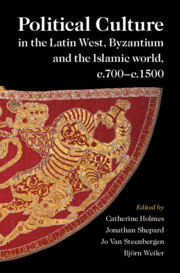 Political Culture in the Latin West, Byzantium and the Islamic World, c.700–c.1500
Political Culture in the Latin West, Byzantium and the Islamic World, c.700–c.1500 Book contents
- Political Culture in the Latin West, Byzantium and the Islamic World, c.700–c.1500
- Political Culture in the Latin West, Byzantium and the Islamic World, c.700–c.1500
- Copyright page
- Contents
- Figures and Maps
- Contributors
- Preface and Acknowledgements
- Abbreviations
- General Maps
- 1 Political Culture in Three Spheres
- 2 Reflections on Political Culture in Three Spheres
- Part I Sources
- Part II Historical Contexts
- Part III Norms, Values and Their Propagation
- Part IV Practice and Organisation
- 13 The Latin West
- 14 Byzantium
- 15 The Islamic World
- Part V Conclusions
- Appendix
- Glossary
- Index
13 - The Latin West
Multiple Elites and Overlapping Jurisdictions
from Part IV - Practice and Organisation
Published online by Cambridge University Press: 11 August 2021
- Political Culture in the Latin West, Byzantium and the Islamic World, c.700–c.1500
- Political Culture in the Latin West, Byzantium and the Islamic World, c.700–c.1500
- Copyright page
- Contents
- Figures and Maps
- Contributors
- Preface and Acknowledgements
- Abbreviations
- General Maps
- 1 Political Culture in Three Spheres
- 2 Reflections on Political Culture in Three Spheres
- Part I Sources
- Part II Historical Contexts
- Part III Norms, Values and Their Propagation
- Part IV Practice and Organisation
- 13 The Latin West
- 14 Byzantium
- 15 The Islamic World
- Part V Conclusions
- Appendix
- Glossary
- Index
Summary
Possession of land, noble lineage and martial prowess was, in theory, a sine qua non for participating in the Latin west’s politics. Yet forms of political organisation diversified: by the late middle ages, urban leaders and the ‘commons’ had forced their way into many political communities, with access to commercial wealth playing an ever more important role. Monarchies, principalities, ecclesiastical polities and city states alike relied on written procedures underpinned by elaborate laws. Legal knowledge and access to the ruler’s court became foundations of elite hegemony – alongside military power which was itself changing, as war taxation and the means of raising armies grew more complex. Education allowed some to rise through administrative service or the law. Despite the attempts of aristocratic military elites to shore up their hegemony, the political culture of most of Latin Christendom was flexible enough to let merchants, lawyers and scholars join or partner those elites in ways that would have been unimaginable in the early middle ages.
Keywords
- Type
- Chapter
- Information
- Political Culture in the Latin West, Byzantium and the Islamic World, c.700–c.1500A Framework for Comparing Three Spheres, pp. 367 - 409Publisher: Cambridge University PressPrint publication year: 2021
